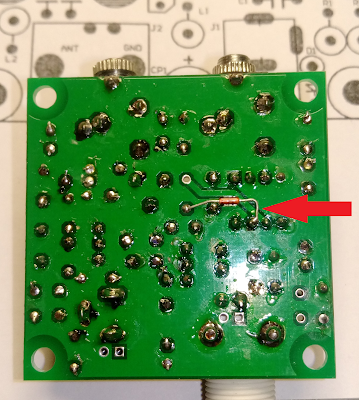 Simple interference fix for the Chinese Pixie
Simple interference fix for the Chinese Pixie
The Chinese Pixie transceiver operating at 7023 kHz has become very popular. It often costs less than 5 USD on Ebay. Like most Pixies it is susceptible to broadcast breakthrough and intermodulation. Much of this is caused by the keying circuit of the audio amplifier, the LM386. The cure is to move the muting diode from the power supply pin (no. 6) to the bypass pin (no. 7). I have described this in another blog post with title: “Using pin 7 of the LM386 to reduce BCI and add side tone to Pixie 2“.
Here are two pictures that show how this can be done for the Chinese Pixie. One needs an additional resistor in the range 10 – 51 ohms. If you can fit it, then use the large 51 ohms resistor that come with some of the kits (I think it is meant for a dummy load). I have used 10 ohms in the picture. It replaces the old R3 of 1 k. The diode D3 is not mounted in the holes provided, and instead it is mounted under the PCB with the minus (denoted by the ring) connected to where D3’s minus was, and the plus side connected to pin 7 of the LM386.
 |
| R3 is indicated by the lower left arrow, and the old placement of D3 is shown with the upper arrow |
 |
| Arrow showing where D3 instead should be soldered. The minus, indicated by the ring, is to the left in the image |
The post “Simple interference fix for the Chinese Pixie” first appeared on the “LA3ZA Radio & Electronics Blog.”













